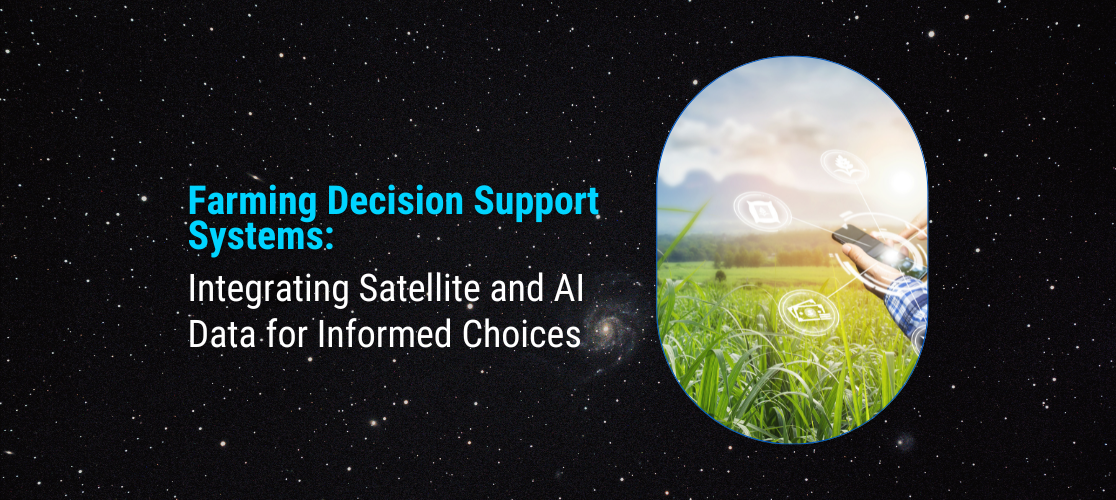18 August 2023
Farming Decision Support Systems: Integrating Satellite and AI Data for Informed Choices

Modern agriculture is undergoing a technological revolution, with the integration of satellite data and artificial intelligence (AI) reshaping the way farmers make decisions. Farming Decision Support Systems (FDSS) are emerging as essential tools that empower farmers to optimize crop management, resource allocation, and environmental sustainability. By harnessing the power of satellite imagery and AI algorithms, FDSS enable farmers to make informed choices that lead to improved yields, reduced environmental impact, and enhanced agricultural efficiency. In this article, we will explore the significance of integrating satellite and AI data within Farming Decision Support Systems and how they are revolutionizing agriculture.
The Role of Satellite Data: Satellite imagery provides a bird’s-eye view of agricultural landscapes, offering insights into crop health, soil moisture, pest infestations, and weather patterns. This data is invaluable for making timely and accurate decisions, allowing farmers to respond proactively to changing conditions.
The Power of AI Algorithms: AI algorithms analyze vast amounts of satellite data and historical information to extract meaningful patterns and trends. Machine learning models can predict crop yields, disease outbreaks, and optimal planting times based on these insights.
Farming Decision Support Systems: FDSS amalgamate satellite imagery and AI algorithms to create actionable recommendations for farmers. These systems consider various factors, such as weather forecasts, soil conditions, and market trends, to provide farmers with real-time insights and guidance.
Precision Agriculture: FDSS enable precision agriculture by tailoring farming practices to specific areas within a field. This minimizes resource wastage, reduces the use of fertilizers and pesticides, and optimizes irrigation, ultimately leading to cost savings and environmental conservation.
Crop Health Monitoring: Satellite data can identify early signs of crop stress, disease, or nutrient deficiencies. AI algorithms analyze this data to alert farmers about potential issues, enabling them to take corrective actions promptly.
Weather Forecasting and Risk Management: FDSS leverage satellite-based weather forecasts to help farmers anticipate adverse conditions such as heavy rains or drought. This information allows farmers to adjust planting and harvesting schedules and mitigate potential losses.
Yield Prediction: AI models trained on historical and real-time data can predict crop yields with impressive accuracy. This information aids farmers in making informed decisions about pricing, supply chain management, and market strategies.
Resource Optimization: By analyzing soil moisture levels, nutrient content, and crop health, FDSS guide farmers in optimal resource allocation. This reduces overuse of water and fertilizers, minimizing costs and environmental impact.
Data-Driven Decision-Making: FDSS transform farming from a traditional, experience-based practice into a data-driven discipline. Farmers can confidently make decisions backed by accurate and current information, leading to improved outcomes.
Environmental Sustainability: The integration of satellite and AI data in FDSS contributes to sustainable farming practices. By optimizing resource use, reducing chemical application, and preventing soil degradation, these systems support eco-friendly agriculture.
Conclusion: Farming Decision Support Systems that integrate satellite and AI data are revolutionizing the agricultural landscape. By providing real-time insights into crop health, weather conditions, and resource management, these systems empower farmers to make informed choices that enhance productivity, reduce environmental impact, and contribute to sustainable agriculture. As technology continues to evolve, the marriage of satellite imagery and AI algorithms within FDSS holds the promise of shaping a future where agriculture is not only more efficient but also more resilient and responsive to the challenges of an ever-changing world.
